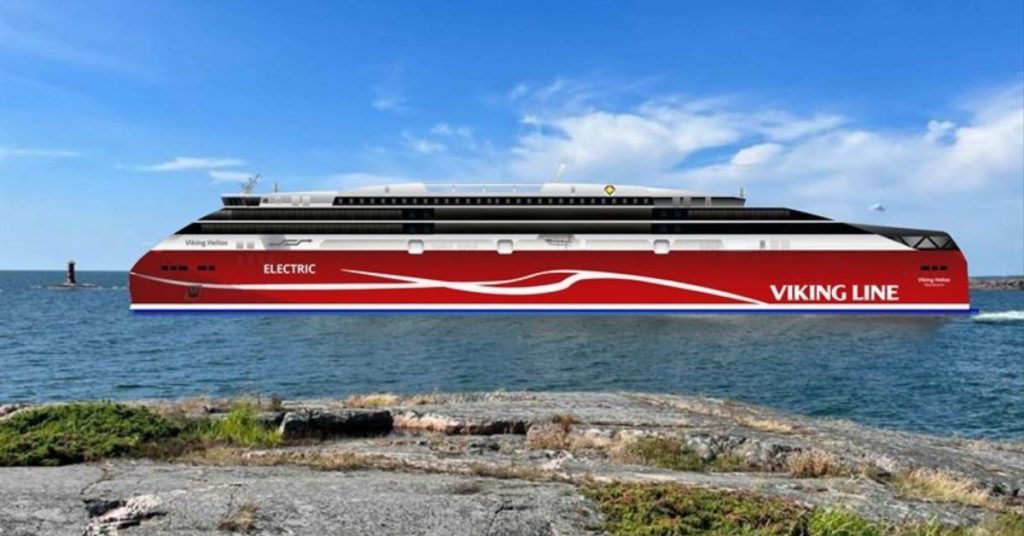Viking Line has introduced an ambitious new vessel concept, Helios, which, if realized, would become the world’s largest fully electric passenger-car ferry. Designed specifically for the busy Helsinki–Tallinn route, the concept marks a major step toward zero-emission maritime transport in the Baltic Sea region.
With an anticipated battery capacity between 85 and 100 megawatt hours (MWh), the Helios concept vessel could transport around 2,000 passengers and 650 cars across the Gulf of Finland in just over two hours. Measuring approximately 195 metres in length and 30 metres in width, the ferry would travel at a speed of about 23 knots and accommodate up to 2,000 freight metres. Unlike traditional ferries, Helios is designed without a funnel — a clear visual indication of its all-electric power source.
Concept Tailored for a Green Maritime Corridor
Developed in collaboration with Rauma Marine Constructions and other partners, the concept has been optimized for the 80-kilometre crossing between Helsinki and Tallinn. The short distance and port accessibility make the route particularly suited to battery-electric operations. Charging will take place in port, requiring infrastructure capable of delivering more than 30 MWh of energy.
Viking Line CEO Jan Hanses described the project as a milestone for maritime transport: “Helios represents a turning point, much like the introduction of sails, steam, or diesel engines in the past. The technology now exists to make large-scale emission-free shipping a reality, and we are fully committed to making it happen.”
A Track Record of Green Innovation
Viking Line has long been recognized as a pioneer in sustainable shipping. In 2013, it introduced Viking Grace, the world’s first passenger vessel powered by liquefied natural gas and biogas. That innovation was followed in 2022 by Viking Glory, a further step toward climate-smart ferry operations. Today, passengers can opt to use biofuel to reduce their carbon footprint by up to 90%, and freight clients are also beginning to adopt cleaner fuel options.
The Helios concept aligns with the broader FIN-EST Green Corridor initiative — a collaboration between Helsinki and Tallinn aimed at decarbonizing regional maritime transport. The initiative includes support from both cities’ ports, Estonia’s Ministry of Climate, and shipping operators such as Viking Line, Tallink Grupp, and Rederi AB Eckerö.
Infrastructure Crucial to Electric Transition
Hanses emphasized the importance of supporting infrastructure. “Electrification of maritime traffic isn’t possible with ship design alone — reliable port-side charging is essential. Jätkäsaari, envisioned as the home port for the new electric vessels, is already undergoing redevelopment, which is vital to our planning.”
Projections from the Port of Helsinki suggest the number of passengers traveling between Helsinki’s West Harbour and Tallinn will more than double from 5.5 million in 2024 to 11.6 million by 2040. Cargo volumes are expected to rise as well.
Hanses noted that rising regulatory pressure and emissions trading costs are driving the need for cleaner operations. “Demand for the Helsinki–Tallinn route remains strong. With electric ships, we can expand our capacity while staying ahead of future environmental regulations. Our goal is to introduce two electric ferries to this route to double our year-round capacity.” Viking Line has submitted a funding application to the EU’s Innovation Fund to support the construction of its first electric ferry, using the Helios concept as a foundation for future planning and procurement processes.
Tags: Electric Ferries, Green Corridor, Maritime, Maritime Innovation, Sustainability, sustainable Shipping, Viking Line



Recent Posts
New Report Highlights Potential of Voluntary Insetting to Support Maritime Decarbonisation, Calls for Robust Safeguards
Smart Ship Hub achieves industry first with ABS emission reporting
Henkel Rolls Out India’s First Mid-Haul Re-Powered Electric Trucks for Commercial Logistics
Sustainability in Focus at 11th SIAM Automotive Logistics Conclave in New Delhi
L&T Energy GreenTech to Establish India’s Largest Green Hydrogen Plant
JK Srivastava Group and Hynfra Announce $4 Billion Green Ammonia Project in Andhra Pradesh
Andhra Pradesh Unveils Ambitious Green Hydrogen Valley Plan to Lead India’s Energy Transition
South Africa advances plans to decarbonize shipping sector